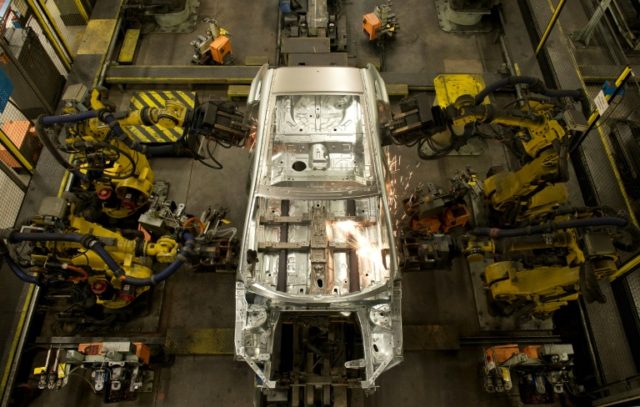Cannock (United Kingdom) (AFP) – “There is no good Brexit!” insists Greg McDonald, chief executive of Goodfish Group, a UK-based company making plastic components for the country’s key car sector.
The small company, nestled in the Midlands not far from Birmingham, the UK’s second largest city, sells one third of its products to mainland Europe, with weekly shipments to Poland and one every ten days to the Czech Republic.
In addition, most of what the group sells in the UK ends up being shipped overseas.
To help Brexit-proof the business — and the whole auto industry is worried about potential disruption at ports — Goodfish is looking at possibly setting up production facilities in central or eastern Europe.
“It’s our way of combatting potential loss of business and also (ensuring) future growth,” McDonald, 56, told AFP.
“If you’re a business owner and all your investment and all your wealth is tied up in your business, which is mostly the case (here), you don’t wait to be told by the politicians what the final outcome is.
“You make plans to address the situation as you see it,” said McDonald, who has lived in France, Germany, Ireland and Switzerland.
– Auto industry Brexit fears –
Goodfish is not alone among car-sector companies shaking up manufacturing processes because of fears Brexit will ultimately make trade harder.
Industry body, Society of Motor Manufacturers and Traders (SMMT), has blamed Brexit uncertainty for plunging UK investment, warning about the harmful impact of new, post-Brexit customs controls.
The Midlands is home to 40 percent of the UK’s 186,000 auto sector workers, including Indian-owned Jaguar Land Rover (JLR) which has already taken the plunge into Europe.
JLR recently opened a 1.4-billion-euro ($1.6-billion) factory in Nitra, western Slovakia, its first in continental Europe ahead of Britain’s planned EU departure on March 29.
UK companies’ manufacturing processes are complicated by the need to import raw materials, which have become more expensive owing to a sliding pound — caused in turn by Brexit jitters.
“Of course we’re suffering from weak sterling because of the fears of Brexit,” McDonald said.
UK manufacturers who have survived previous difficult financial cycles “are the exporters”, McDonald pointed out.
A young company with 125 staff, Goodfish was founded in 2010 and has annual turnover of more than 10 million pounds ($12.8 million, 11.3 million euros).
How it builds on its success is likely to depend largely on the final terms of the UK’s post-Brexit trade agreements.
The draft document agreed with Brussels this week states that during a transition period ending on December 31, 2020, EU law will apply to give businesses time to prepare for new ties.
This means the UK will continue to participate in the EU Customs Union and the Single Market.
It allows Britain continued market access to the remaining 27 EU countries but it must respect the rules on free movement of goods, capital, services and labour without having any say in EU decision-making.
“Of course a customs union gets around most of the problems but having to follow the rules of the EU without actually having any say on what these rules are — that’s definitely a worse position” than now, lamented McDonald.

COMMENTS
Please let us know if you're having issues with commenting.